England 26-17 Australia: Plenty of power but where is the spark?
- Published
- comments
England 26-17 Australia: Ben Morgan double gives hosts win
Stuart Lancaster and his England coaching staff are not given to ostentatious displays of public emotion, which is why their man-hugs and fist-pumps after the 26-17 win over Australia told you everything about the increasing pressure they have been feeling this autumn.
Defeat on Saturday against a weary side playing their 15th Test in 25 weeks would have left them facing a bleak mid-winter. Instead they can move into World Cup year with the impression of momentum restored, even if the truth is rather more nuanced.
Because for all the pleasure in this first win over one of the southern hemisphere big boys in more than a year, this has been a month in which England have slowed rather than advanced.
What did we learn from the win over the Wallabies? We learned that England could overpower them in the scrum, and we knew that already.
We learned that Australia's backs play with a pace, fluency and cutting edge that England's cannot. We knew that before too.
England will go into next year's Six Nations with a young fly-half from a famous rugby league dynasty as a calm, controlling figure in the pivotal number 10 shirt. They have a number eight who can smash through defenders and bring a snoozing stadium alive.
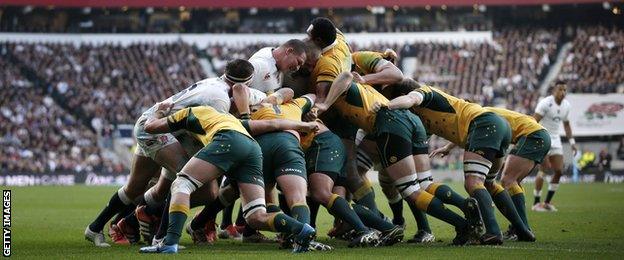
As is traditional, England were utterly dominant against Australia in the scrum on Saturday
It's exactly how they ended the last one. It's just the names that have changed: Owen Farrell and Billy Vunipola then, George Ford and Ben Morgan now.
There are reasons for optimism, most importantly the impressive displays of the undercooked understudies in a pack missing six British and Irish Lions, not least the settling-in at international level of winger Jonny May and the blooding of 20-year-old Anthony Watson.
Beyond that? Brad Barritt proved he is relentless in defence. Courtney Lawes is a second row who can chop men down and run through them with equal alacrity. Chris Robshaw will run and burrow and tackle and carry all day long.
All that we knew too.
On Saturday, England's forwards, for the fourth time in four weeks, won plenty of possession. For the first time this autumn, their half-backs played in a way that allowed that set-piece supremacy to be exploited - kicking to the corners, for territory, beyond the defence and in front of them. Where against the All Blacks and Springboks there was often panic, this time there was pragmatism.
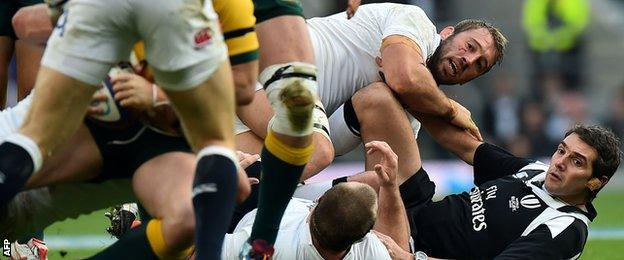
Chris Robshaw (top) will tackle all day long - including, inadvertently, referee Jerome Garces this time
Too often there was also a predictability and lack of precision with ball in hand.
Lancaster was keen to point out afterwards that his team have scored 28 tries in this calendar year, with 21 of them coming from the backs and 13 from the back three.
They have also left plenty out there. On Saturday they were typically industrious but often easy to read. Having Barritt bash the ball up the middle is one tactic. It should not be the principal one.
That lack of variety, of dummy runs, made England easy to read. Twice in promising positions, Billy Twelvetrees was caught man and ball by an onrushing defence when a little more ingenuity and surprise would have spared his bruises.
Lancaster's strategies have been disrupted by injury. A fit Manu Tuilagi would have given his side an uncomplicated threat that is almightily hard to negate.
They have also been upset by a selection policy that has lacked consistency and veered towards the puzzling.
It is laudable to try new faces and combinations. It is sensible too to give them time to bed in, let alone flourish.
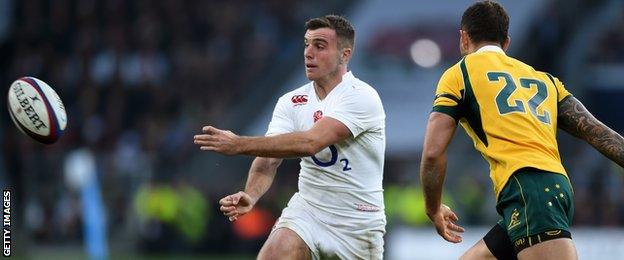
Many pundits thought fly-half George Ford should have started for England from the first autumn Test
Ford should have been handed his opportunity earlier, not least because Farrell was out of form and desperately short of game-time after an injury-disrupted start to the season. A full debut against the world champions is a formidable prospect. So too is facing them after a solitary run-out for your club.
Kyle Eastmond was thrown in at inside centre against the best two sides in the world when Farrell inside him was struggling to keep his head above water. When his Bath team-mate Ford came in, he was gone from the squad.
Ford and Farrell were tried together. The experiment lasted just over an hour.
Stick or twist? It is an unenviable choice sometimes for a head coach, but it is arguably his primary concern. Lancaster has backed young guns in the pack and been rewarded for his hunches. In the backs he has seemed to make his picks under pressure and slightly panicked.
Only a third of the team that beat the Wallabies in the corresponding fixture a year ago remained on Saturday. Some of that is down to injuries. But with just eight games to go until the World Cup starts - three of them warm-up matches - do you even know England's preferred centre partnership, let alone their first-choice XV?
"The best thing to restore belief is winning," said forwards coach Graham Rowntree on Saturday, and he is absolutely right.
He was also correct when he continued: "We desperately needed the win. It was vital because at times our performance levels haven't been as high as they should have been."
England played to strengths - Lancaster
Lancaster described his mood as the month closes as one of quiet satisfaction. "Internally we were rock solid," he said, at the suggestion that his side's development had stalled this autumn.
"We always believed in the plan and the players, and I thought the players applied the plan really well.
"The World Cup will look after itself. All the teams will develop over the next 10 months. There's been enough shown by all the northern hemisphere sides."
Some have shown more than others. Ireland have marched on under Joe Schmidt, beating not just the Wallabies but the Springboks too. Scotland have awakened under their own new coach, Vern Cotter. Even Wales have finally broken one part of their three-way southern hemisphere hoodoo.
England are a team with great strength in depth. They have enviable power up front and big names to come back.
They also lack a spark and an obvious way of discovering one.
Six Nations titles can be won by sides of limited creative ability that have a dominant pack. World Cups cannot.
- Published29 November 2014

- Published29 November 2014
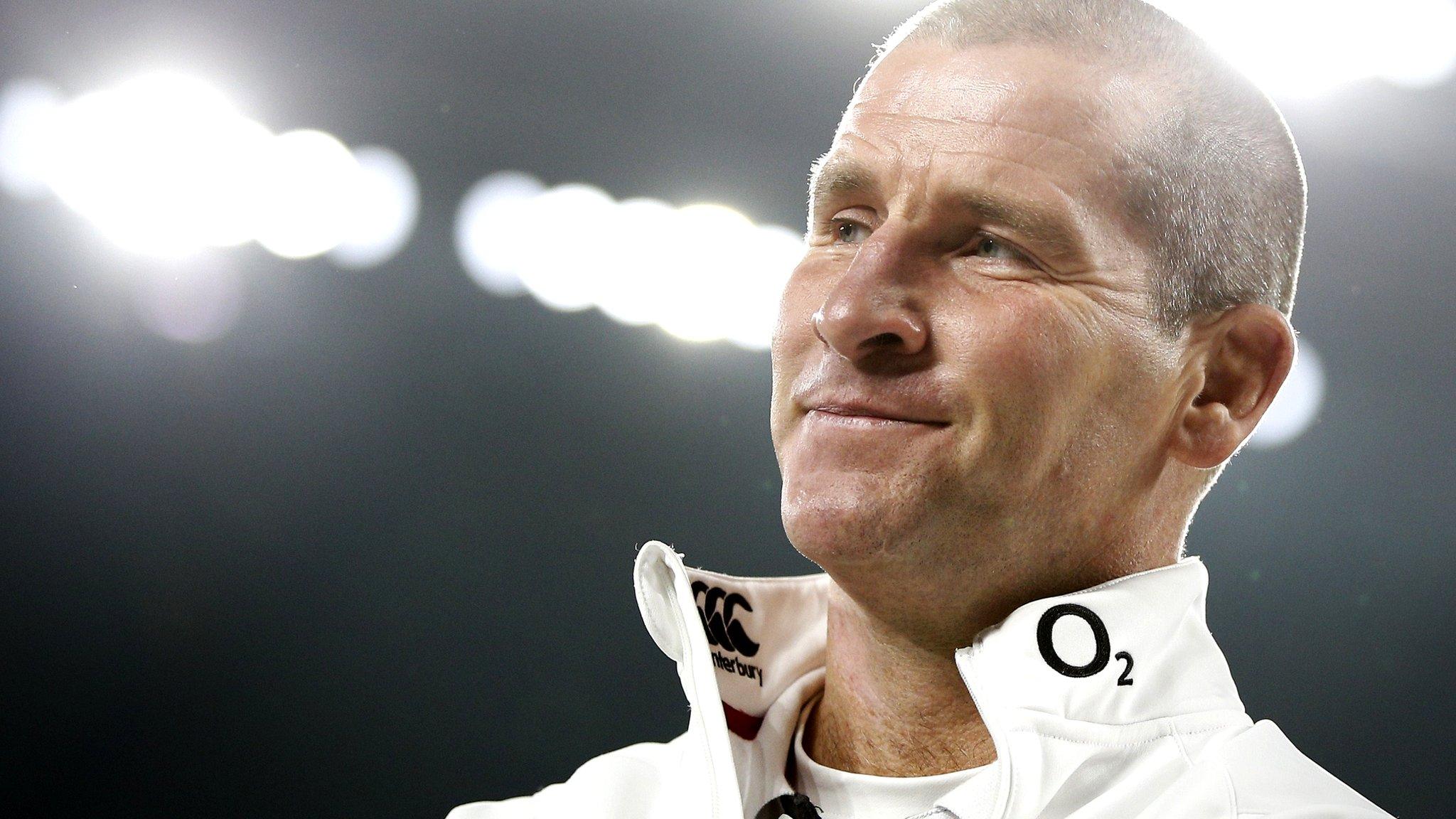
- Published28 November 2014
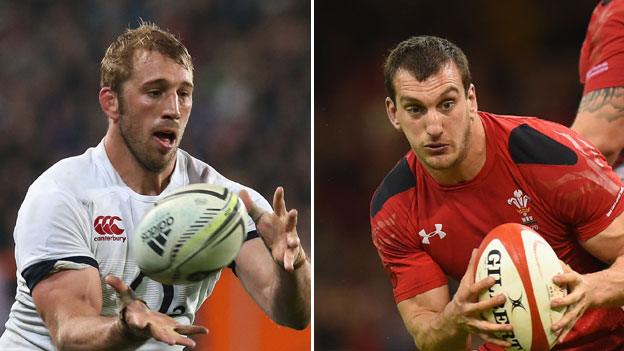
- Published28 November 2014
- Published15 November 2014
- Published14 September 2016

- Published15 February 2019
